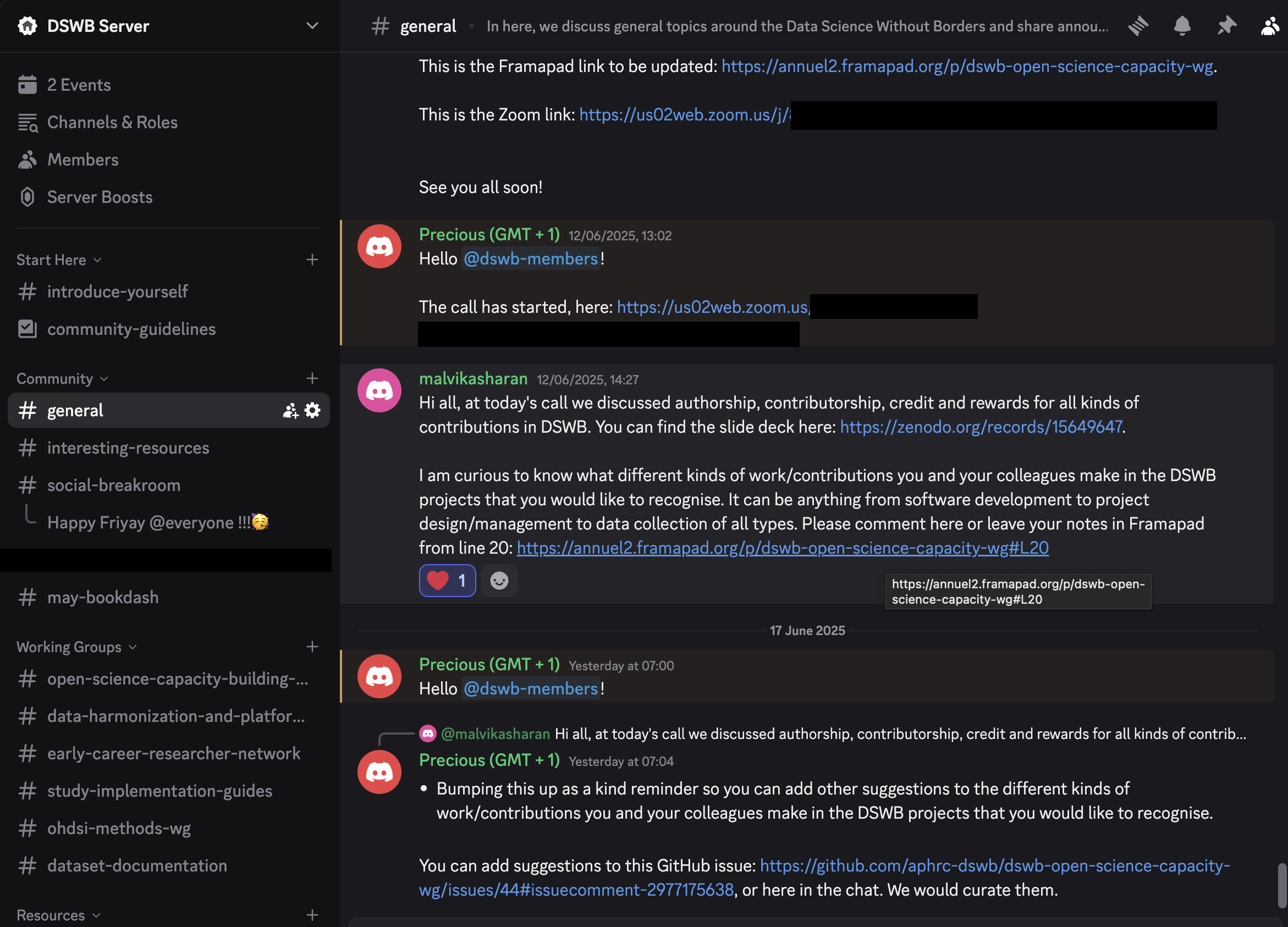A Discord workspace has been established and is maintained by the OSPO Now team for the DSWB community. You can use this joining link to connect and utilise its features.
This platform offers a lightweight solution for instant messaging and audio calls, facilitating quick exchanges and real-time collaborations among team members. Different channels provide structured spaces where people can ask questions, learn about each other’s work, and get involved with community projects. While it is not the only communication channel used by the community, it is a popular platform, increasingly used for enhancing direct interactions among different teams.
For the DSWB project, these are our default channels - which you join once you click the link tp join our community:
#introduce-yourself: This channel lets us know when new members join the community, and enables us to properly welcome and orient them as new members!
#community-guidelines: This channel contains our community guidelines and lets community members access our code of conduct very easily.
#general: We keep you updated on recurring community calls, community events, and other general conversations around the DSWB project.
#interesting-resources: You can share resources and materials you think are interesting or useful to the DSWB project/community members.
#social-breakroom: Our informal room, here we come to get a break and share random/fun conversations. In this channel, feel free to let us know about your favourite pet pictures!

We also have working group-specific channels:
#open-science-capacity-building-wg: Join this channel to share and receive information around the DSWB Open Science and Capacity Building Working Group.
#data-harmonization-and-platform-wg: Join this channel to share and receive information around the DSWB Data Harmonization and Platform Working Group.
#study-implementation-guides: This channel was facilitates conversations around developing study implementation guides for the research questions of the students.
#early-career-researcher-network: Join this channel to have conversations and receive information regarding the Students WG.
#ohdsi-methods-wg: This is the space for learning, discussion, and collaboration around feature extraction methods using HADES, as part of the OHDSI ecosystem.
#dataset-documentation: This channel focuses on learning how to document datasets using schema.org vocabularies and JSON-LD structure.
If there are any other channels you’d like to see in the workspace, or ones that we use that you don’t see listed here – you can correct this page by making an issue or pull request on Github, or you can reach out to Precious Onyewuchi(preshh0) via precious@osponow
Best Practices for Using our Community Discord Channel¶
Our Discord community abides by the code of conduct listed in the #community-guidelines channel, and a more detailed one here.
For communication, here are some guidelines that would make interactions inclusive and enabling for everyone in the community:
Images: Use alt text to describe images, diagrams, or other visuals (Learn more about how to do this in this tutorial.). Don’t forget to add important information like context in your description!
Links: If you are inserting a link into a message, limit the number of embedded links within a message. Avoid embedding links within replies to messages when possible, as links posted within threads are not readable for screen readers.
Emojis: Limit the use of emojis that break up narrative flows of information where possible (such as emojis listed between works). Not all people are able to access the emoji reactions option within Discord, and use written affirmations as well!
Bandwidth: In order to make sure that Discord is accessible in low-bandwidth environments for the community, avoid posting data-intensive content like videos directly into the channels. Instead, prioritise hosting the content on other platforms (such as YouTube), and sharing the link.
Openness: For topics that would require community collaboration, we encourage creating issues and discussions on the Github repository in order to ensure the widest reach and participation possible.
In general, we encourage an approach to Discord that is as accessible as possible, for as many people as possible. Please practice kindness when you communicate with others, and be mindful of cultural, linguistic, disability, and individual differences that may affect how people communicate online.
If there is anything missing, please reach out to the Community Manager Precious Onyewuchi on Discord or by email at precious@osponow
To learn more about Discord and how to use its feature, please refer to this document: Onyewuchi (2025). (Cite it as: Onyewuchi, P. (2025, January 30). Why should we use Discord?. Zenodo. DOI 10.5281/zenodo.14275805.)
A WhatsApp group is used for general posts and reminders (maintained by the APHRC team), and the LinkedIn page is used for sharing updates externally, boosting the visibility of our work.
These communication platforms complement our primary communication channels, providing additional avenues (often requiring manual cross-posting) for community engagement and outreach.
- Onyewuchi, P. (2025). Why should we use Discord? 10.5281/ZENODO.14775688